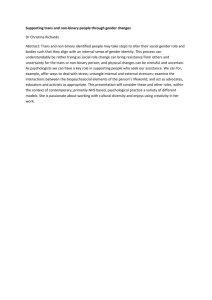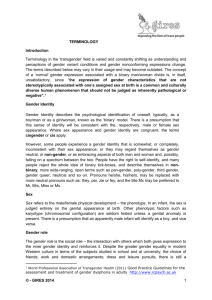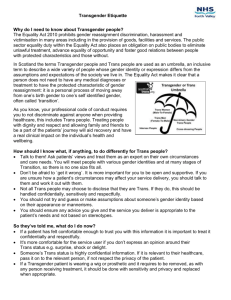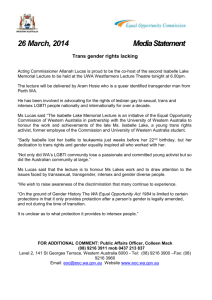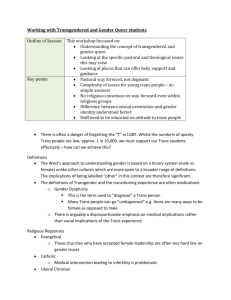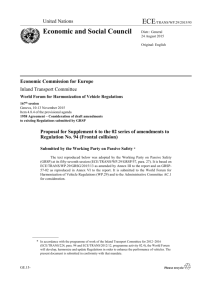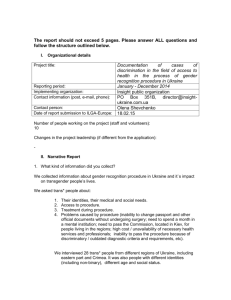Transgender Inquiry Briefing Response
advertisement
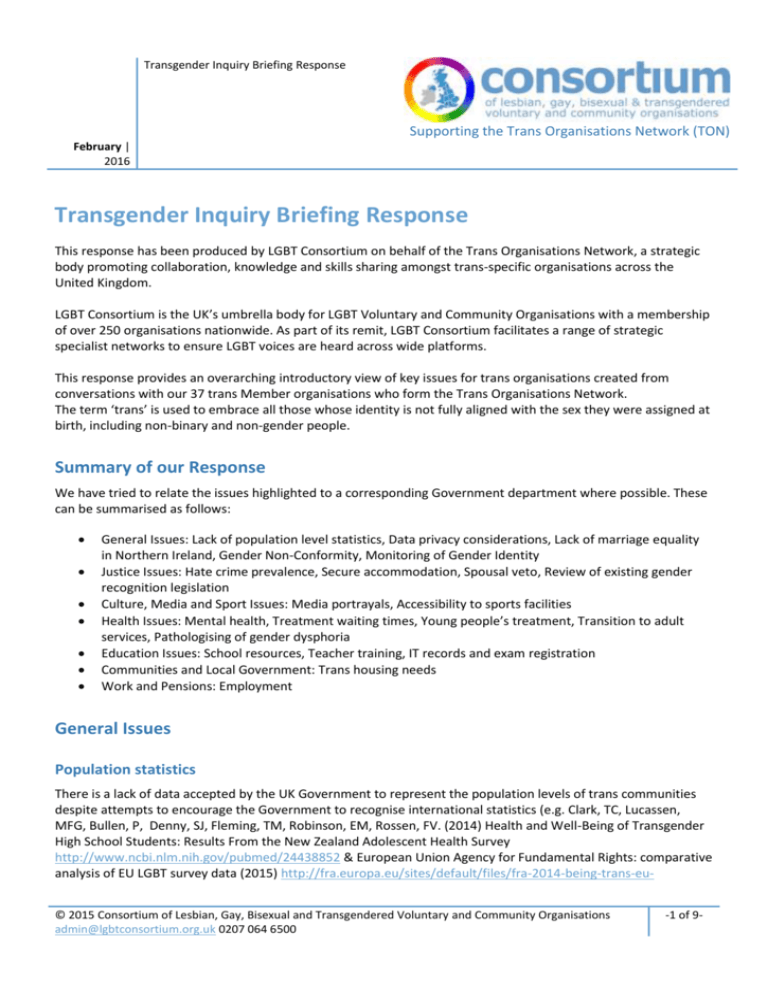
Transgender Inquiry Briefing Response Supporting the Trans Organisations Network (TON) February | 2016 Transgender Inquiry Briefing Response This response has been produced by LGBT Consortium on behalf of the Trans Organisations Network, a strategic body promoting collaboration, knowledge and skills sharing amongst trans-specific organisations across the United Kingdom. LGBT Consortium is the UK’s umbrella body for LGBT Voluntary and Community Organisations with a membership of over 250 organisations nationwide. As part of its remit, LGBT Consortium facilitates a range of strategic specialist networks to ensure LGBT voices are heard across wide platforms. This response provides an overarching introductory view of key issues for trans organisations created from conversations with our 37 trans Member organisations who form the Trans Organisations Network. The term ‘trans’ is used to embrace all those whose identity is not fully aligned with the sex they were assigned at birth, including non-binary and non-gender people. Summary of our Response We have tried to relate the issues highlighted to a corresponding Government department where possible. These can be summarised as follows: General Issues: Lack of population level statistics, Data privacy considerations, Lack of marriage equality in Northern Ireland, Gender Non-Conformity, Monitoring of Gender Identity Justice Issues: Hate crime prevalence, Secure accommodation, Spousal veto, Review of existing gender recognition legislation Culture, Media and Sport Issues: Media portrayals, Accessibility to sports facilities Health Issues: Mental health, Treatment waiting times, Young people’s treatment, Transition to adult services, Pathologising of gender dysphoria Education Issues: School resources, Teacher training, IT records and exam registration Communities and Local Government: Trans housing needs Work and Pensions: Employment General Issues Population statistics There is a lack of data accepted by the UK Government to represent the population levels of trans communities despite attempts to encourage the Government to recognise international statistics (e.g. Clark, TC, Lucassen, MFG, Bullen, P, Denny, SJ, Fleming, TM, Robinson, EM, Rossen, FV. (2014) Health and Well-Being of Transgender High School Students: Results From the New Zealand Adolescent Health Survey http://www.ncbi.nlm.nih.gov/pubmed/24438852 & European Union Agency for Fundamental Rights: comparative analysis of EU LGBT survey data (2015) http://fra.europa.eu/sites/default/files/fra-2014-being-trans-eu© 2015 Consortium of Lesbian, Gay, Bisexual and Transgendered Voluntary and Community Organisations admin@lgbtconsortium.org.uk 0207 064 6500 -1 of 9- Transgender Inquiry Briefing Response Supporting the Trans Organisations Network (TON) February | 2016 comparative-0_en.pdf). This would indicate a significant population of trans people who could potentially be covered by the Equality Act and Gender Recognition Act. As a consequence of ignoring population growth, the ever increasing referrals to Gender Identity Clinics: 50% per annum in the adolescent population (and doubling in the current year), and 20% and rising in the adult population, cannot be accommodated within existing NHS provision. Without accepted population estimates, it remains difficult to argue for appropriate service levels and a worrying number of trans people are left in vulnerable and potentially dangerous situations. Solution: It is clear that robust research into trans populations needs to be commissioned. Data Issues The collecting of data, and clarity regarding their use and storage, are issues that need to be considered. The methods and systems involved must not have a disproportionately negative affect on trans people. The confidentiality of data in respect of individual trans people must be secured, and the collection must not be discriminatory. For example, our Members report that voice recognition has caused unnecessary problems for some trans people who have been subjected to failed security checks on the basis of their voice not appearing to match the assumption of a name or gender. Solution: Guidance already commissioned by the GEO should be published and promoted, and reviewed within this current Parliament. Marriage—Northern Ireland It is unacceptable that one part of the United Kingdom continues to require trans people to end their existing marriage prior to gender recognition. Solution: Political pressure needs to build on the Northern Ireland Assembly to address this inequality and support given to LGBT organisations to help legislate to resolve this issue with The Assembly. More Info: For more detailed information this issue, please refer to the official response from Focus: Northern Ireland & UK Trans Info. Non-Binary Population Increasingly, our Members are raising issues around how we can improve inclusion by those not bound by the binary man/woman models. Those in the wider group of people having gender non-conforming or non-binary identifications are further marginalised in society, a situation which is exacerbated by a lack of clear messaging from Government on the level of their inclusion within legislation. Ultimately, we would like to see wider inclusion of non-binary issues within the framework of transgender legislation, including employment, education and health and social care. Solutions: We propose clear guidance to be written by the EHRC / GEO on the extent to which people who are non-binary are included within existing legislation, rather than currently having to rely on perception. © 2015 Consortium of Lesbian, Gay, Bisexual and Transgendered Voluntary and Community Organisations admin@lgbtconsortium.org.uk 0207 064 6500 -2 of 9- Transgender Inquiry Briefing Response Supporting the Trans Organisations Network (TON) February | 2016 During the process of delivering marriage vows, consider being able to use the word spouse instead of just husband/wife, or add an additional set of gender neutral vows. More Info: For more detailed information this issue, please refer to the official responses from Gender Agenda, UK Trans Info, GIRES & Scottish Transgender Alliance. Monitoring There has been extensive debate, particularly within the Department of Health and the Equality and Human Rights Commission, around the monitoring of gender identity. There is an inconsistency of questions asked, and some confusion between the issues of sex and gender. Solution: A Government roundtable should be held to discuss appropriate monitoring questions, followed by a Government and Trans Sector document on agreed approach to monitoring. Review of Existing Legislation The view of Members is that the Gender Recognition Act 2004 needs to be reviewed and re-evaluated. This is in part linked to the “Spousal Veto” and pathologisation issues detailed later in this document. Whilst the GRA as it stands has worked for trans people who are eligible, there are instances where there is misuse of the Gender Recognition Act. Local Authorities, schools and employers for example request a Gender Recognition Certificate from trans individuals but they do so in circumstances where the person either does not qualify (e.g. being under 18 for instance) or where for genuine reasons, the individual feels they cannot obtain a Gender Recognition Certificate. The Equality Act and the Human Rights Act should, even in the absence of a GRC, provide the privacy, respect, etc. deserved by trans individuals, but there is a lack of clear evidence that this is the case. We would also like to make special reference to the Council of Europe’s resolution on discrimination against trans people http://assembly.coe.int/nw/xml/XRef/X2H-Xref-ViewPDF.asp?FileID=21736&lang=en. Solution: As per a later point, we would propose removal of the “spousal veto” and we would propose a reduction of the age to be covered by the Gender Recognition Act. We would recommend this to be reduced to 16 or removed entirely. The GRA also needs the removal of medical criteria to define a trans person. The Equality Act should be expanded to cover Gender Identity rather than just Gender Reassignment to allow recognition on nonbinary people. More Info: For more detailed information this issue, please refer to the official response from UK Trans Info, Scottish Trans Alliance Justice Issues Hate Crime Evidence from the recent EHRC commissioned research (Chakraborti, N. and Hardy, S. (2014) The Leicester Hate Crime Project: LGB&T Hate Crime Reporting: Identifying Barriers and Solutions: University of Leicester © 2015 Consortium of Lesbian, Gay, Bisexual and Transgendered Voluntary and Community Organisations admin@lgbtconsortium.org.uk 0207 064 6500 -3 of 9- Transgender Inquiry Briefing Response Supporting the Trans Organisations Network (TON) February | 2016 http://www.equalityhumanrights.com/publication/lgb-and-t-hate-crime-reporting-identifying-barriers-andsolutions) shows that while victims of transphobic hate crime can be targeted up to 509 times a year, only 3 in 10 trans people report incidents or crimes. Whilst nationally we are seeing a small encouraging rise in the number of crimes and incidents being reported, this still represents a tiny proportion of the overall picture. More collaborative initiatives need to be led by Government to increase awareness of transphobic hate crime and ensure agencies from all sectors are working to the same agenda. Further data can also be found from The All Wales Hate Crime Research Project http://www.refweb.org.uk/files/Wales%20Hate%20Crime%20Report.pdf. Solution: Government funded initiatives should be invested in to increase awareness and reporting levels of transphobic hate crime. This should be seen in the context of wider hate crime issues and how crossover issues can be factored in. There is also a need for research into why perpetrators commit hate crime. More Info: For more detailed information this issue, please refer to the official response from The Gender Trust. Secure Accommodation Secure accommodation can put trans people in a particularly vulnerable position. Health agencies are supposed to have oversight of these institutions but there is no specialist training provided, resulting in trans people being addressed in the wrong way and situations where they have not been taken to their clinic appointments. This leaves them untreated, in some cases, for 2 or 3 years. In the past, clinics have sent specialists to secure accommodation but due to lack of time and resource, this is no longer happening. Prisons have Prison Service Orders in relation to trans prisoners but secure units don’t have the same setup, leaving vulnerable people in an impossible situation. Solution: We would propose guidance being produced for secure accommodation units from the Department of Health and guidance for treating trans offenders on remand. More Info: For more information about this issue, please refer to the official response from GIRES. Spousal Veto Introduced as part of The Marriage (Same Sex Couples) Act discussions, this has been one of the most harmful pieces of legislation for trans people. There is no justification for giving one party a right to veto another party’s human rights and preventing someone from obtaining a Gender Recognition Certificate. This only leads to further discrimination in an already disproportionately affected community. There are similar issues regarding the circumstances in which a marriage to a trans person can be annulled due to non-disclosure under the Matrimonial Cause Act 1973 (and the Civil Partnership Act 2004). Solutions: Repeal of the requirement in The Marriage (Same Sex Couples) Act for a partner of a married or civil partnered trans person to give written permission before a GRC can be issued. Repeal of clause 12(h) of the Matrimonial Cause Act and 50€ of the Civil Partnership Act. More Info: For more detailed information this issue, please refer to the official response from Focus: Northern Ireland & UK Trans Info. © 2015 Consortium of Lesbian, Gay, Bisexual and Transgendered Voluntary and Community Organisations admin@lgbtconsortium.org.uk 0207 064 6500 -4 of 9- Transgender Inquiry Briefing Response Supporting the Trans Organisations Network (TON) February | 2016 Culture, Media & Sport Issues Media Portrayals Media coverage of trans people has often been exploitative and sensational, rather than reflecting their real lives or issues that they face. Representations of trans women dominate, leading to the relative invisibility of trans men and non-binary people. Solution: Government could take a lead in including images and stories/case studies from trans people in publication and a range of communications. This should include mentions of trans people within areas not focused on trans issues to increase positive visibility. More Info: For more detailed information this issue, please refer to the official response from Trans Media Watch Health Issues Mental Health A ground breaking study into the mental health of trans people was undertaken in 2012 (Trans Mental Health Study 2012, J McNeil et al http://www.scottishtrans.org/wp-content/uploads/2013/03/trans_mh_study.pdf), highlighting the high prevalence of mental health issues trans people face as a result of discrimination, harassment, etc. The report identifies the need for further research into transgender mental health and wellbeing in order to identify solutions that will have wide reaching and cross department implications. Solution: A Government-led action plan for improving transgender mental health and wellbeing should be drawn up, tackling both short, medium and long-term conditions in alignment with the wider mental health improvement agenda. More Info: For more detailed information this issue, please refer to the official response from TransBareAll Treatment Waiting Times There are legal limits and rights on waiting times for treatment across the UK for access to Gender Identity Clinics and surgery. Neither is being achieved in practice, although more money is being put into surgical services. We need to see a complete rethink of the assessment, referrals and treatment processes provided by the Clinics prior to surgery in order to help tackle the increase in people presenting with gender dysphoria. With the increase of numbers presenting, lack of capacity within the GICs, we have waiting times being quoted of 2-3 years for some people between GP referral to initial consultation with a GIC. It is also important to point out the geography of the Gender Identity Clinics and the vast distances trans people are expected to travel for treatment. As an example, people in Wales are having to travel to London for treatment, and we are encouraged by the Welsh Assembly’s vote to look into opening a new GIC. © 2015 Consortium of Lesbian, Gay, Bisexual and Transgendered Voluntary and Community Organisations admin@lgbtconsortium.org.uk 0207 064 6500 -5 of 9- Transgender Inquiry Briefing Response Supporting the Trans Organisations Network (TON) February | 2016 Solution: We would like to see an initiative by the Department for Health and other relevant bodies across the UK to encourage more surgeons and other doctors and clinicians to specialise in this area. Even if there were more Gender Identity Clinics, a lack of trained clinicians will take time to overcome. There is also a need for new treatment pathway where treatment is locally delivered by the GP and nearby endocrinologist. More Info: For more detailed information this issue, please refer to the official response from GIRES & UK Trans Info Young People’s Treatment Medical interventions for children and adolescents have been inadequate and do not meet international best practice standards. Whilst it has been positive that interventions to suspend the development of unwanted secondary sex characteristics are now available, more prompt implementation is needed to ensure that medical intervention is not delayed, leaving young at risk of mental health deterioration, leading to other serious conditions such as self-harm or suicidality. Solution: An accelerated process needs to be put in place to allow for urgent puberty suspension and cross sex hormone medication in young people diagnosed with gender dysphoria who have already commenced pubertal development. More Info: For more detailed information this issue, please refer to the official response from Mermaids & GIRES Transfer to Adult Services Transfer from adolescent to adult service may occur from 17. Too often this transfer involves further assessment, over many months, without cross-sex hormones being introduced. More Info: For more detailed information this issue, please refer to the official response from Mermaids Pathologising of Trans People Many see the NHS process trans people go through to transition to their new gender as demeaning. The process of gender recognition requires a psychiatric report, treating trans people with a mental disorder label. An appropriate process should be established to allow trans people to self-identify without the need for psychiatric interventions. Solution: Remove the need for a psychiatric report on gender dysphoria diagnosis, in line with the current proposals by the World Health Organisation to reclassify it out of the Mental and Behavioural Disorders section. More Info: For more detailed information this issue, please refer to the official response from Focus: Northern Ireland © 2015 Consortium of Lesbian, Gay, Bisexual and Transgendered Voluntary and Community Organisations admin@lgbtconsortium.org.uk 0207 064 6500 -6 of 9- Transgender Inquiry Briefing Response Supporting the Trans Organisations Network (TON) February | 2016 Sexual Health Service providers must ensure that services are trans led and “trans friendly” and that their staff are “trans aware”. Sexual Health Clinics must acknowledge the specific needs of trans people and ideally make special arrangements to facilitate access to trans specific services. This can simply take the form of regular weekly drop in sessions along the lines of the cliniQ model at 56 Dean Street (for more information see www.cliniq.org.uk) the only sexual health and wellbeing service in the UK by trans people for trans people. Solution: PHE and NHS (E) should implement patient records systems which monitor different gender identities and which validate both current identities and gender histories. Adoption of such an approach would not only produce more accurate and realistic HIV and sexual health statistics, but would also inform more appropriate and effective responses to sexual health needs For more information, please see the detailed response from CliniQ Education Issues School Resources W know there are pockets of good practice around engaging with gender identity across the country but this is by no means consistent. There is a need for schools (from a primary age) to have central access to key resources that will help them to engage with these issues, preferably before young people present with particular issues. There are existing best practice resources in use across the country which could be the basis of coordinated work (e.g. Cornwall County Council/Intercom Trust, Allsorts Youth Project, Wrexham Council). Solution: Whilst we recognise the complications surrounding formal guidance for schools, we would propose the collation of a list of useful educational resources around gender identity that can be endorsed by the Department for Education. More Info: For more detailed information this issue, please refer to the official response from Mermaids Teacher Training There is a need for staff training to be widely available for all school staff, including during teacher training, around gender identity. There is a lack of even basic understanding within many education professionals, which results in young people being left vulnerable and unable to gain access to appropriate support. Existing e-learning (e.g from GIRES and Mermaids) are useful reference points. Solution: As a minimum, an e-learning module on gender identity should be commissioned for inclusion within all teacher training curriculum, which includes links to locally-based resources and support. We would encourage face to face training and engagement to allow for real-life trans engagement. © 2015 Consortium of Lesbian, Gay, Bisexual and Transgendered Voluntary and Community Organisations admin@lgbtconsortium.org.uk 0207 064 6500 -7 of 9- Transgender Inquiry Briefing Response Supporting the Trans Organisations Network (TON) February | 2016 IT Records and Registration for Examinations The change on name and sex markers within IT systems remains a big problem without any workable solutions to date. Young trans people are often prevented from changing their name or sex marker within their educational records, which then impacts the name registered for examinations. We need to ensure schools recognise the impact this has on a young person’s development and ensure that inadequate IT systems don’t prevent workable solutions. Solution: The DfE should give a strong lead in advising educational establishments that they must change records and reissue certificates so that young people do not face the unnecessary embarrassment of gender history following them into and throughout their adult lives More Info: For more detailed information this issue, please refer to the official response from Mermaids and GIRES. Communities and Local Government Trans Housing Needs Many trans people can find themselves at crisis point when it comes to their own housing needs. This can be as a result of coming out to partner, friends or family or even when being discovered as trans by neighbours. This can often means people can find themselves needing to leave their existing housing arrangements immediately, sometimes resulting in homelessness and loss of all social contacts. Whilst trying to source new accommodation or living arrangements trans people can face further discrimination from housing providers. Solution: We would encourage DCLG to host a roundtable between national housing organisations and key trans organisations to discuss recommendations for action. More Info: For more detailed information this issue, please refer to the official response from Unique Transgender Network Older People’s Needs It is the experience of many older trans people that service providers can ignore their needs and treat them less favourably because of their trans status. This places barriers to accessing appropriate support, information and guidance, resulting in an increase in (e.g.) long-term health conditions, poor mental health and severe depression. We estimate that approximately 200,000 50+ people reside in the UK. Solution: Education is an important part of developing awareness and good service provision in this area and we would encourage wider use of existing key resources such as Public Health Wales’s resources, such as http://www.screeningforlife.wales.nhs.uk/sitesplus/documents/1129/Trans%20screening%20v1%20English%20%28Final%29 .pdf and the National LGB&T Partnership’s trans factsheet on ageing https://nationallgbtpartnershipdotorg.files.wordpress.com/2012/07/np-trans-health-factsheet-ageing-final.pdf. © 2015 Consortium of Lesbian, Gay, Bisexual and Transgendered Voluntary and Community Organisations admin@lgbtconsortium.org.uk 0207 064 6500 -8 of 9- Transgender Inquiry Briefing Response Supporting the Trans Organisations Network (TON) February | 2016 More Info: For more detailed information this issue, please refer to the official response from Unique Transgender Network and Manchester Trans Forum Work & Pensions The Department for Work and Pensions’ policies for retaining and processing personal data which reveal its customers as transgender violate the right to respect for private life under the European Convention on Human Rights because they are not sufficiently clear, precise or accessible. In a landmark legal case, a 44-year old from Greater London challenged the legality of the DWP’s systems for handling personal information which discloses that she is transgender. Clearly all organisations must ensure that their data storage systems do not violate the privacy of trans people. Clear guidance from the GEO that this is a legal requirement would help to overcome the present confusion and mismanagement of data relating to ‘sensitive information, about gender histories. Employment Many employers, including those in the armed forces are rising to the occasion when an employee, or military person transitions. However, many employers do not have adequate pre-emptive policies in place even when required to do so, in accordance with the Public Sector Equality Duty. Problems arise in specific areas, one of which is, inevitably, toilet facilities. This is a topic which could be clarified by the GEO and the EHRC, so that employers never demand that trans people use toilets (even as an interim measure) that are not consistent with their gender role and presentation. An issue that cuts across all employment and educational environments, is the protection of an individual’s privacy. In the public arena, privacy is protected under the Human Rights Act 1998 (Article 8); and the negative impact of breaching a trans person’s privacy is also unlawful, under the Equality Act both in the private and the public sector. A frequently encountered issue, is the change of name and title, in binary IT systems which were not designed to accommodate such changes. See High Court ruling above. Also teachers seeking a new job in a different school, would have their trans history revealed on the DfE Intranet Solution: GEO and/or EHRC to publish guidance More Info: For more detailed information this issue, please refer to the official response from Scottish Transgender Alliance & GIRES © 2015 Consortium of Lesbian, Gay, Bisexual and Transgendered Voluntary and Community Organisations admin@lgbtconsortium.org.uk 0207 064 6500 -9 of 9-
